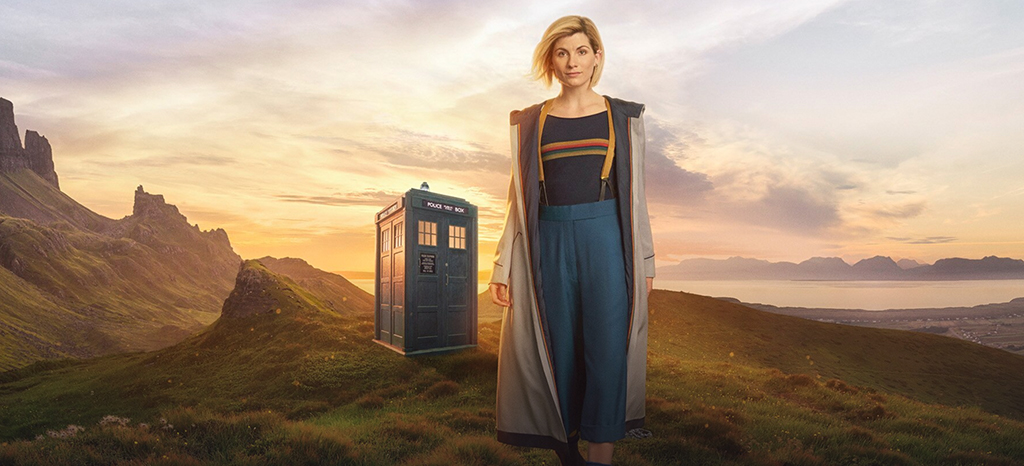
No Guest Found in this category
On July 16 2017, Supa-Star Jodie Whittaker made history when she was cast as The Thirteenth Doctor in beloved British sci-fi series Doctor Who. Aside from being the first woman cast in the iconic role, Whittaker’s casting brought about a new era of the show in other ways, with the introduction of three new companions, the most regular companions of the NuWho revival, and heralding the beginning of a new showrunner, Chris Chibnall.
Before Whittaker crashes her Tardis into Supanova in Melbourne (6-7 April) and Supanova on the Gold Coast (13-14 April), let’s take a look back at The Thirteenth Doctor’s most underrated moments.
The Thirteenth Doctor embraces the big change
The initial announcement that The Doctor was going to regenerate into a female form for the first time was a controversial one for some fans. Others, however, were more interested in how The Doctor themselves, a character who had been portrayed as physically male for over five decades, would cope with the significant change in their personal circumstances. While it may have been expected that they would struggle, The Thirteenth Doctor instead embraces her new form immediately.
This ends up being brilliant foreshadowing, with the reveal that The Doctor is the Timeless Child, and in many of the earlier lives she cannot remember, she had already been female numerous times.
The Thirteenth Doctor spends most of her first story with amnesia… and still saves the day
For most of her first episode, The Woman Who Fell to Earth, The Thirteenth Doctor, on top of the usual post-regeneration confusion and fatigue, is also suffering from amnesia after a fall from her heavily damaged Tardis. As a result, the early part of the episode has her leaning heavily on the support and kindness of her soon-to-be companions, Graham, Ryan, and Yaz.
However, despite not remembering her own name, Thirteen still intuitively takes charge of the situation, solving the mystery behind the arrival of strange alien orbs, building a new sonic screwdriver entirely from scratch, and having her first confrontation with the villainous Tzim-sha.
She proves that The Doctor was made to be a hero, whether she remembers or not.
Thirteen lets her companions see the outcome of their historical fix-it for Rosa Parks
When becoming involved in stories involving historical figures, it is usually The Doctor’s goal to avoid becoming directly involved in historical events so as not to influence or inadvertently alter them. However, in the episode Rosa, based on the story of civil rights activist Rosa Parks, their efforts to thwart time-meddling villain Krasko lead to The Thirteenth Doctor and friends becoming part of history, filling seats on the Montgomery bus and leading to Rosa’s decision not to give up her seat for white passengers.
Noticing that her companions, particularly Graham, are struggling with their role in this unpleasant piece of history, Thirteen takes them to see an asteroid named after Rosa, allowing them to see how their role in preserving Rosa’s history helped her eventually change not just the world, but the universe. This allows Graham more closure than companions usually get from historical stories.
The Thirteenth Doctor befriends a sentient universe
Thirteen and her companions find themselves helping a teenager who is vision-impaired, Hanne, to solve the mystery of her father Erik’s disappearance, eventually discovering that Erik has been lured into a sentient universe, the Solitract, kept there by an illusion of his deceased wife. Graham also finds himself tempted by a vision of his own recently deceased wife, Grace. However, The Doctor realises that the Solitract is not trapping people for malicious reasons… it is simply lonely.
The Doctor gives up her own freedom in exchange for Erik and Graham’s, genuinely eager to befriend the sentient universe. Unfortunately, the Solitract cannot permanently sustain a second living being, so the friendliest thing she can do for the poor lonely universe is convince it to let her go, which she accomplishes with an impassioned speech. For some fans, this speech was the first moment Jodie Whittaker truly felt like The Doctor.
The Doctor gives up on a mystery
During the course of the six-episode Doctor Who: Flux series, The Thirteenth Doctor comes into possession of a Chameleon Arch fob watch containing the memory of her forgotten lives, including, perhaps, where she had come from as The Timeless Child.
The Doctor resists the urge to open it, instead dropping the watch into the centre of the Tardis and instructing the ship not to let her have it back. Usually, The Doctor can never resist a mystery, yet The Thirteenth Doctor resists the greatest personal mystery she has ever faced in the name of protecting those around her.
The Thirteenth Doctor gets all her Companions home in one piece
Unfortunately, The Doctors of the Doctor Who revival have a rather terrible track record for returning their travelling companions to the time and place they belong when their time with The Doctor is over. Most, even if they do not outright die, have elements of tragedy to the end of their stories.
This is not the case for the companions of The Thirteenth Doctor. When Graham and Ryan opt to remain on Earth at the end of Revolution of The Daleks, she is disappointed, but lets them go with little fuss. The same with Dan when he decides to bring an end to his relatively short Tardis tenure at the beginning of The Power of The Doctor. Towards the end of the same special, prior to Thirteen’s regeneration, she returns her final remaining companion, Yaz, safely to Earth. This makes The Thirteenth Doctor the only Doctor of the NuWho era to have every single one of her companions make it home in one piece, without any tragic postscripts to their story.
It is an aspect of The Thirteenth Doctor’s tenure that is not discussed nearly enough, and one for which this history making incarnation deserves to be celebrated.
You can catch Jodie Whittaker as a Supa-Star guest at Supanova in Melbourne (6-7 April) and Supanova on the Gold Coast (13-14 April).









